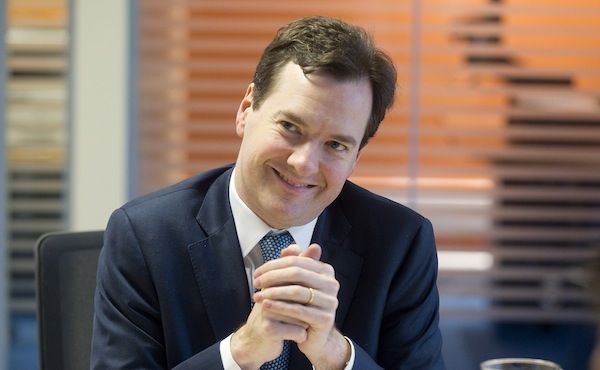George Osborne has been behaving rather oddly of late. Normally, he’s known as the ‘submarine’ for surfacing only twice a year. Now, it’s twice a week. On Tuesday he delivered a speech to supermarket staff, talking tough on welfare and sometimes lapsing into a Dick Van Dyke mockney accent. On Thursday he used the Philpott case to raise questions about the welfare system. Yesterday, David Cameron backed him. It looks like a concerted effort to speak on the wavelength of target voters – but will it work? In this week’s Spectator, Matthew Parris suggests it may not. He has spoken at length to many of the 40 MPs who hold the most marginal seats. He notices that the calls for radicalism tend to come from those with massive majorities, where those on the frontline are more cautious. Here’s what he has to say:
‘An image of the party as concerned about the poor was important to them, and there was some irritation with MPs in more prosperous seats who can sound careless about welfare. I encountered repeated personal support for Iain Duncan Smith: a sizeable handful told me they were happy to trust the details to him…
‘The message is this: ‘We don’t want to look nasty and we don’t want to look mad.’ It would be wrong to say my interviewees were not concerned about Ukip; some were very worried indeed. But they had a wary eye on the floating voters who might float the Liberal Democrats’ or Labour’s way, or stay at home, if the Conservatives acquired a foaming-at-the-mouth appearance. Probably for this reason, a handful of the MPs made the same point to me: that a specific policy on (say) immigration or benefits or overseas aid that might get strong assent from many voters could still hurt the party if it fed into a vaguer and more general impression of unkindness. ‘I may be in favour of cuts, but I don’t like you lot,’ was a possible voter response.’
It’s a brilliant column, do read the whole thing. And while I normally tend to support the more practical Tory messages, I think Matthew is on to something crucial. Welfare reform is tough, and while it may be viewed with relish by some voters it is utterly inappropriate for any minister — especially the Chancellor of the Exchequer — to look as if they share that relish. To do a Peter Lilley (see video, below).
I wholeheartedly agree with Alex Massie, who says “the Philpott case is horrific; so is the attempt to hijack it for any political purpose”. It could well be that focus groups tell Osborne what polls tell us: that the a good chunk of the electorate is with him, and believes that the welfare state holds a good chunk of the blame for the Philpott case. But for Osborne to link the two is, in my opinion, unbecoming of a Chancellor.
And as Matthew Parris’s column indicates, it is also electorally toxic for the Tories. It provides plenty ammunition for the Labour attack dogs, who wish to portray the Tories as political sadists. IDS never uses such language: to him, blame lies with the system.
As we say in the Spectator’s leading article this week, George Osborne is wrong to look as if he relishes welfare cuts:
‘The Tory posters depicting ‘shirkers’ are deplorable. If the British government paves the way to welfare dependency, is it any wonder so many millions walk down that road? There is nothing wrong with the British national character, and it ought to be beneath any politician even to hint otherwise. As Iain Duncan Smith has made it clear throughout, the blame lies not with the people who followed the government-created incentives, but with the architects of the system.’
Here is Peter Lilley addressing the 1992 Tory Conference – an example of what NOT to do…
UPDATE: That so many CoffeeHousers agree with Osborne underlines that he is giving voice to a widely- and deeply-held opinion. And just to underline: I’m dead against a welfare system that turns kids into income streams, and supported the (Labour and Tory) plans to address this. But I think politicians should refrain from seeking political capital in heinous crimes. By all means, argue about the welfare state and the 130 families on benefits with more than ten kids. But let’s reject with contempt any insinuation that welfare predisposes anyone towards manslaughter. Osborne was not making this insinuation. But in mentioning Philpott and welfare reform in the same soundbite, he linked the two – wrongly, in my view. He unwisely played right into the hands of his enemies.
UPDATE 2: This blog seems to encourage some on the left. I’m not sure why. They’re on a losing wicket on welfare reform, as Phil Collins pointed out in yesterday’s Times. It was, once, a Labour agenda: Hutton and Purnell were the pioneers. In disowning this agenda, Labour are making what Janan Ganesh calls “a truly strategic mistake that will hang over it for years.” Osborne agrees – hence his excitement. His missteps are usually made when he feels he has Labour on the run. But as missteps go, it will be a popular one. While I find his relish unseemly, many of Labour’s target voters will think he is spot on.







Comments